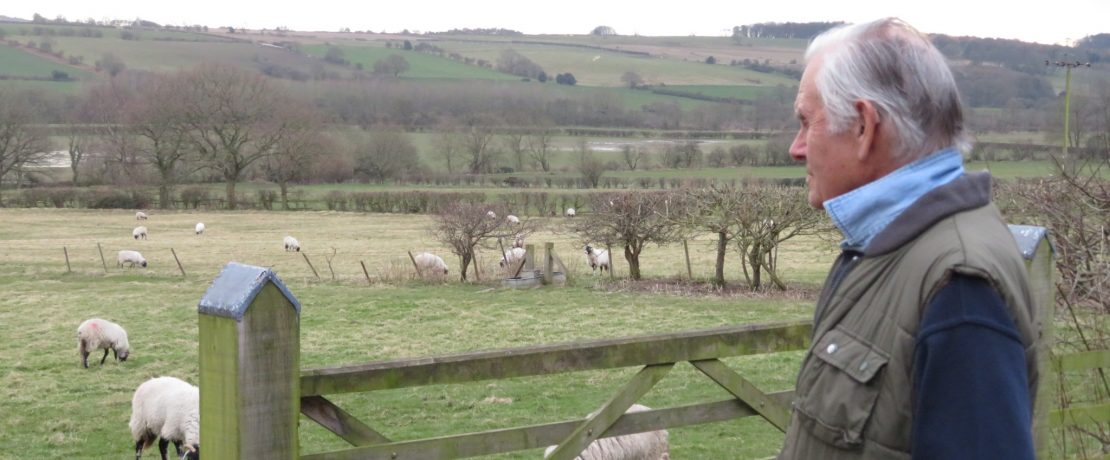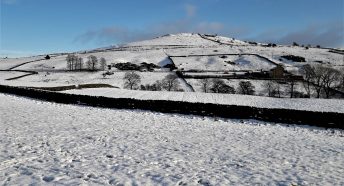Growing Importance
David Cooke is a farmer based near Harewood. He was involved in CPRE for many years, including as a Trustee of the West Yorkshire branch and also as an active campaigner in his local area of Leeds. As one of the few longstanding CPRE volunteers whose livelihood stems directly from working the land, we asked David to tell us about his experiences and his thoughts on the future of farming.
You can read more stories about food and farming in West Yorkshire in our Ways of Seeing Magazines – especially Issue 4, which has a focus on the earth on which West Yorkshire is founded.
We used to have a farm near South Milford that was mostly arable, but when we moved here we changed to arable and sheep. For many years we grew barley, wheat, oats and potatoes, and employed a contractor to do the drilling and combine harvesting. In those early days potatoes were spun out and then picked up by hand . Times have changed! Our arable days are now gone. We do have a small flock of our own sheep but surplus grass is grazed by hill farmers.
Our own Mule sheep are a cross between Border Leicester and Scottish Blackface. We use these because they’re really good mothers. Previously we had Suffolks, but they weren’t so interested in their lambs. We used to lamb inside early in the year but it is healthier outside. We now lamb in April when my young granddaughter comes to help. We aim for two lambs per sheep – this is about getting the supplementary feeding right, as the number and size of lambs is influenced by the mother’s diet. We sell the lambs to markets in Otley, Doncaster, York and sometimes Thirsk.
Depending on the time of year we sometimes have around 250 to 300 graziers sheep in the fields. But this year the long spell of wet weather has caused poaching of the soil. This is where the sheep break down the waterlogged soil with their feet, and then the grass doesn’t grow as well. As a result, we have much reduced stocking at the present. For many arable farmers the wet winter has been a problem, as many were unable to get onto the land to sow winter and spring corn at the right time. This could cause a shortage at harvest time, and a rise in prices.
Because of Brexit farmers will not get the EU Single Farm Payment, which is based on acreage, but an amount reducing to nothing over a period of a few years. In West Yorkshire we have many hill farms who rely on this payment to make a living. So this will be challenge for them.
Now there is a new Agriculture Bill coming. The focus for payments will be on care for the land itself, so we will to get a payment for environmental work like hedge planting and controlling water flow. This is important and necessary work. There isn’t enough information yet for farmers to be able to plan their business. .
Because of leaving the EU, there are many other questions. Will there be tariffs on the meat that is sold to the EU market? Will imports be cheaper? Will our high standards be undercut by lower standard imports from outside the EU? Either way, we need a strong domestic market for the meat. It would be shortsighted to allow the livestock side to wither. Price is important especially for the hill sheep farmer. On my neighbour’s farm, by rotating a large stock of sheep with an arable crop, the sheep are fertilising the field for the arable crop so it’s very low input. If a reduction in British meat farming coincided with availability of cheaper, imported meat grown with lower standards, then that would be the worst of both worlds. Our quality and standards are our greatest asset, and we need to be giving that message to the public.
I first became involved in CPRE in the 1990s, a little before the time that we successfully helped to stop an opencast coalmine at Ledston. My main concern nowadays is about green spaces being eroded, in towns and on the edge of towns. Of course it’s true that some farmers see the lucrative chance of selling their land for development, but the land has to be in the right, sustainable place for this to be an option.
Builders should be building more affordable homes and homes for people who want to downsize. The difficulty is that planning has been eroded so it can’t push for the right types of homes, and it’s struggling to protect green spaces around towns and villages.
What motivates me? I always wanted to farm – I like the independence and being my own boss. You do need a certain type of personality for it. There are much easier ways to make money, and I know my daughters and son never want to take the farm on, but it is a business, and if you’re enthusiastic you will succeed. The Agricultural Colleges are doing a really good job in encouraging skill and innovation. There is potential for future generations of farmers – I’m optimistic about that.









